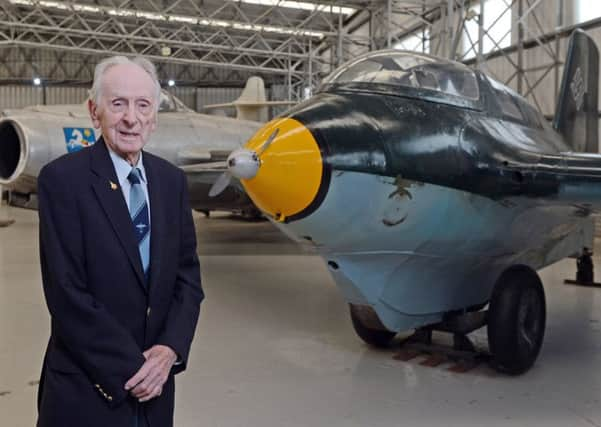'˜World's greatest' aviator Eric Winkle Brown dies at 97


Leith-born Captain Eric “Winkle” Brown, who died on Sunday, holds three world records and was present at some of the most significant events of the last century.
As the most decorated pilot in the Royal Navy’s Fleet Air Arm, he flew 487 different types of aircraft – more than anyone else in history – and performed a record-smashing 2407 aircraft carrier landings.
Advertisement
Hide AdAdvertisement
Hide AdBorn on January 21, 1919, he was educated at the Royal High School and Edinburgh University, where he learned to fly in the University Air Squadron.
He witnessed the 1936 Olympic Games during his trips to Berlin as a student and became a fluent German speaker, before being arrested by the SS and deported.
To earn money for his studies, Brown became a ‘wall of death’ rider on a small 250cc two-stroke motorbike, often sharing the wall with his boss and a fully-grown male lion riding pillion.
At the outbreak of war, he joined the Royal Navy Volunteer Reserve as a Fleet Air Arm pilot. His unique skills soon found him flying fighters from the world’s smallest aircraft carrier, HMS Audacity – before later surviving this ship being torpedoed by a German U-boat in 1941.
Advertisement
Hide AdAdvertisement
Hide AdHe returned to Germany at the end of the war on the orders of Winston Churchill, to capture and fly advanced German aeroplanes.
Here, he witnessed the liberation of Bergen-Belsen camp, acting as interpreter for the trial of the camp commandants. Later, he interrogated prominent Nazis, including Hermann Göring, Heinrich Himmler and the senior Luftwaffe.
As Chief Naval Test Pilot, Brown achieved a host of notable firsts during his extraordinary life. He landed the first jet and the first twin-engined aeroplane, and tested the world’s only jet-powered seaplane fighter in the Solent.
In 1957, he put his German language skills to good use when he was appointed to train the embryonic German Naval Air Arm.
Advertisement
Hide AdAdvertisement
Hide AdHe retired from the Royal Navy in 1970 in the rank of Captain and became the Director-General of the British Helicopter Advisory Board, and was later president of the Royal Aeronautical Society from 1982 to 83.
Brown, who lived in West Sussex in his final years, is the author of a series of autobiographical books and was the subject of the 3000th edition of ‘Desert Island Discs’ in November 2014. A year later, he was honoured at No 10 Downing Street as a Great Scot.
He passed away at East Surrey Hospital on Sunday following a short illness, and is survived by his son, Glen, and his second wife, Jean Kelly Brown.
Aviation expert Paul Beaver, a friend of Brown’s for the last 40 years, paid tribute to a man who was “self-effacing, modest and an absolute delight”.
He said: “He was a great Scot and one of the greatest living pilots. Nobody will ever beat his records. He was a man whose life will never be repeated.”